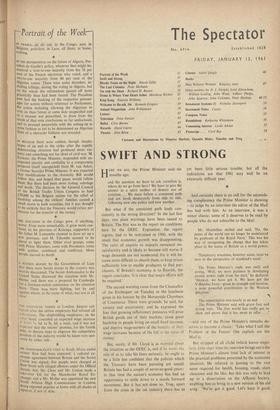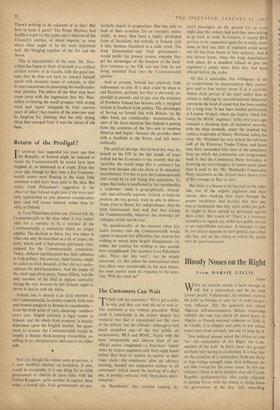SWIFT AND STRONG
HERE we are, the Prime Minister said six months ago,
and the question we have to ask ourselves is, where do we go from here? We have to give the answer in a spirit neither of despair nor of cynicism ... We must follow a consistent path and not lurch desperately from side to side, following now one policy and now another.
But what if the consistent path leads con- sistently in the wrong direction? In the last few days, two plain warnings have been issued to Britain. The first was in the report on conditions here by the OEEC. Expansion, the report regrets, had to be restrained in 1960, with the result that economic growth was disappointing. The ratio of exports to imports remained un- satisfactory and is likely to become still worse if wage demands are not moderated, for it will be- come more difficult to absorb them, to keep prices sufficiently low to enable producers to find pur- chasers. If Britain's economy is to flourish, the report concludes, 'it is clear that major efforts will be required.'
The second warning came from the Chancellor of the Exchequer on Tuesday at the luncheon given in his honour by the Merseyside Chambers of Commerce. There were grounds, he said, for anxiety and uncertainty; and he expressed the fear that growing inflationary pressures will price British goods out of their markets, cause great hardship to people living on small fixed incomes, and deprive wage-earners of the benefits of theit wage increases because of the fall in the value of money.
But, surely, if Mr. Lloyd is as worried about the situation as the OEEC is, and if he wants th,: rest of us to take his fears seriously, he ought to be a little less confident that the policies which the Treasury have been pursuing are sound. Britain has had a couple of never-so-good years: in that time the nation's economy has had an opportunity to settle down to a steady forward movement. But it has not done so. True, apart from the crisis in the car industry there has as yet been little serious trouble; but all the indications are that 1961 may well be an extremely difficult year.
And certainly there is no call for the astonish- ing complacency the Prime Minister is showing —to judge by an interview the editor of the Mail has had with him. As an interview, it was a minor classic; some of it deserves to be read by people who do not subscribe to the Mail.
Mr. Macmillan smiled and said, 'No, the peace of the world can no longer be maintained by gunboats of the Royal Navy.' This was his way of recognising the change that has taken place in the status of Britain as a world power.
'Temporary vexations, however acute, must be
seen in the perspective of mankind's need.'
The Prime Minister's reply was swift and strong. 'Well, we were partners in developing atomic power right from the start,' he declared. 'Anyway, we have got it. We have got the V-Bomber force—given its strength and location, a most powerful contribution to the Western deterrent.'
4IN
The conversation was nearly at an end.
The Prime Minister said with grave face and strong tone, The free world has really got to show and prove that it has more to offer . . : —and one of the Prime Minister's remarks de- serves to become a classic: 'Take what I tall the Problem of the Future' (the capitals are the Mail's).
But stripped of all cliche (which leaves singu- larly little else) what the interview brings out is the Prime Minister's almost total lack of interest in the practical problems presented by the economic situation. He referred in passing to the vast sums required for health, housing, roads, slum clearance and the like; but this was only to lead up to a dissertation on the Affluent Society, enabling him to bring in a new version of his old song: 'We've got it good. Let's keep it good. There's nothing to be ashamed of in that.' But how to keep it good? The Prime Minister had hardly a word on this point; not a mention of the Treasury's worries, or about exports, or even about what ought to be his most important task, the bringing together of the Six and the Seven.
This is characteristic of the man. Mr. Mac- millan has begun to think of himself as a civilised civilian version of de Gaulle, with the good for- tune that he does not have to concern himself much with domestic issues or colonies, so that he can concentrate on presenting his world-states- man persona. The editor of the Mail may have come away with the impression that Mr. Mac- millan is viewing the world prospect 'with strong mind and vigour unsapped by four onerous years of office; but readers of the interview may be forgiven for thinking that the only strong thing that emerged from it was the odour of old ham.



































 Previous page
Previous page